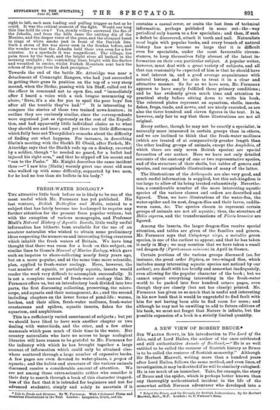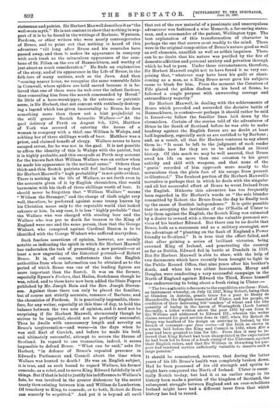A NEW VIEW OF ROBERT BRUCE.*
Sin WA.LTER SCOTT, in his introduction to The Lord of the Isles, said of Lord Hailes, the author of the once celebrated and still authoritative Annals of Scotland,—" He is as well entitled to be called the restorer of Scottish history as Bruce is to be called the restorer of Scottish monarchy." Although Sir Herbert Maxwell, writing more than a hundred years after Lord Halles, follows the same method, and even lines, of investigation, it may be doubted if he will be similarly eulogised. He is too much of an iconoclast. Take, for example, the story of Bruce and the spider, which is perhaps better known than any thoroughly authenticated incident in the life of the somewhat selfish Norman adventurer who developed into a • Robert the Bruce, and the Struagls for Scottish Independence. By Sir Herbert Maxwell, Bart., M.P. London G. P. Putnam. Bons. statesman and patriot.. Sir Herbert Maxwell describes it as "the well-worn myth." He is not content to show that nothing in sup- port of it is to be found in the writings of Barbour, Wyntoun, Fordoun, or other writers who were nearly contemporaries of Bruce, and to point out that nothing is heard of this adventure "till long after Bruce and his comrades have passed away, and then it makes its appearance in company with such trash as the miraculous appearance of the arm- bone of St. Fillan on the eve of Bannockburn, and worthy of just about as much consideration." He finds an explanation of the story, and of its appearance in the Life of Bruce, in the folk-lore of many nations, such as the Jews. And then "coming nearer home, we recognise the same venerable fable in Cornwall, where spiders are held sacred because it is be- lieved that one of them wove its web over the infant Saviour, thus concealing him from the search commanded by Herod." So little of a hero-worshipper, in the extreme or patriotic sense, is Sir Herbert, that not content with ruthlessly destroy- ing a legend which has given immortality to Bruce, he does something more than throw out a hint prejudicial to the still greater Scotch favourite Wallace :—" At the gaol delivery of Perth on August 8th, 1296, Matthew of York was accused of entering the house of a woman in company with a thief, one William le Waleys, and robbing her of three shillings worth of beer. Matthew was a priest, and claimed benefit of clergy. Wallace seems to have escaped arrest, for he was not in the gaol. It is not possible to affirm the identity of this le Waleys with the patriot, but it is highly probable, and this escapade at Perth may account for the known fact that William Wallace was an outlaw when he made his appearance in the national cause." Others than thick-and-thin Scotch patriots will feel inclined to say that Sir Herbert Maxwell's "high probability" is not quite evident. There is nothing in the life of Wallace, as set forth even in the accounts given of it by English chroniclers, that would harmonise with his theft of three shillings worth of beer. It should never be forgotten that "William Wallace" means "William the Stranger," and the charge of theft might very well, therefore, be preferred against some tramp known by his Christian name only to the reputable world that looked askance at him. In any case, it is less "highly probable" that the Wallace who was charged with stealing beer and the Wallace who was put to death for treason to the King of England were one and the same person, than that the George Wishart, who conspired against Cardinal Beaton is to be identified with the George Wishart who suffered martyrdom.
Such fearless assertions of opinion, however, are mainly notable as indicating the spirit in which Sir Herbert Maxwell has undertaken the task of presenting a new portrait—or at least a new engraving of the historical portrait—of Robert Bruce. It is, of course, unfortunate that the English authorities from whom information can be obtained as to the period of which Bruce was one of the leading figures are more important than the Scotch. It was on the former, especially Rymer's Foedera, that Hailes, Scotchman though he was, relied, and to these have now been added the State Papers published by Mr. Joseph Bain and the Rev. Joseph Steven- son. Against these there can only be placed the familiar, but of course not strictly accurate, romance of Barbour, and the chronicles of Fordoun. It is practically impossible, there- fore, for any writer, especially at this time of day, to hold the balance between the two sets of opinion, and it need not be surprising if Sir Herbert Maxwell, strenuously though he strives to be impartial, should not be perfectly successful. Thus he dwells with unnecessary length and severity on Bruce's tergiversation—and worse—in the days when he was still Earl of Carrick, and before be made his bold, and ultimately successful, attempt to secure the throne of Scotland. In regard to one transaction, indeed, it seems impossible to defend Bruce. "What can be said," asks Sir Herbert, "in defence of Bruce's repeated presence in Edward's Parliament and Council about the time when Wallace was hunted to death ? He was an English subject, it is true, and as such bound to regard Wallace, his former comrade, as a rebel, and to serve King Edward faithfully in all things. But if that is held to justify his indifference to Wallace's fate, he was involved in the greater dishonour by the secret treaty then existing between him and William de Lamberton. Of treachery to King, to comrade, or to both, Robert de Bras can scarcely be acquitted." And yet it is beyond all cavil
that out of the raw material of a passionate and unscrupulous adventurer was fashioned a wise Monarch, a far-seeing states- man, and a commander of the patient, Wellington type. The best explanation of this transformation of character is perhaps the one that occurs most readily to the mind. There were in the original composition of Bruce's nature good as well as evil elements, unselfish as well as selfish impulses. There can be no doubt that his nature was purified by the fire of domestic affliction and personal anxiety and privation through which he had to pass. Under these circumstances, therefore, Sir Herbert Maxwell ought not to have found it so very sur- prising that, "whatever may have been his guilt or short- coming as a man, as a King Bruce never gave his subjects cause to blush for him. From the moment the Countess of Fife placed the golden diadem on his bead at Scone, he followed a single purpose with unwavering courage and extraordinary sagacity!'
Sir Herbert Maxwell, in dealing with the achievements of Bruce which preceded and succeeded the decisive battle of Bannockburn, is content—or perhaps it should rather be said is forced—to follow the familiar lines laid down by the chroniclers. Certain of the stories told of the adventures of Bruce in the South of Scotland before he was able to make headway against the English forces are no doubt at least half-legendary, especially such as are certified to by Barbour ; and, as a result, all that Sir Herbert ventures to say about them is: "It must be left to the judgment of each reader to decide how far they are to be admitted as literal history. Of this much we may be well assured, that Brace owed his life on more than one occasion to his great activity and skill with weapons, and that none of the gestis ' recorded of him approach more nearly to the
miraculous than the plain fact of his escape from pursuit in Glentrool." The freshest portion of Sir Herbert Maxwell's narrative is perhaps that in which he deals with the singular and all but successful effort of Bruce to wrest Ireland from the English. Hitherto this adventure has too frequently been regarded in Sir Herbert's words as "the sole blunder committed by Robert the Bruce from the day he finally took up the cause of Scottish independence." It is quite possible that in accepting the invitation of the O'Neills of Ulster to help them against the English, the Scotch King was animated by a desire to reward with a throne the valuable personal ser- vices of his brother Edward. But there can be no doubt that Bruce, both as a statesman and as a military strategist, saw the advantage of "planting on the flank of England a Power friendly to Scotland." It is true that the effort failed, and that after gaining a series of brilliant victories, being crowned King of Ireland, and penetrating the country as far as Dublin, Edward fell in battle at Dundalk in 1318.
But Sir Herbert Maxwell is able to show, with the help of two documents which have recently been brought to light in the Public Record Office, that nine years after his brother's death, and when his two ablest lieutenants, Moray and Douglas, were conducting a very successful campaign in the North of England against Edward the Third, Bruce himself was endeavouring to bring about a fresh rising in Ulster :—
" The two authentic references to the expedition are those: First, an instrument whereby, on July 12, 1327, King Robert, being then at Glendun in Antrim, grants truce for a year to Henry de Maundeville, the English seneschal of Ulster, and his people, on condition of their delivering 100 cendres ' of wheat and the like quantity of barley in the haven of Weringfirth (Loch Larne) Secondly, a letter written about the year 1335 by one John le fitz William and addressed to Edward III., wherein the writer claims reward for good service done in 1327, when Sir Robert de Bruys was baulked of his design on arriving in Ireland, by the breach of covenant—par faux covine—of the Irish as shown in a return laid before the King and Council in 1332, when £50 a year had been granted to him for life. From this it may be .in- ferred that King Robert had been disappointed in the expectation he had been led to form of a fresh rising of the Ulstermen against their English rulers, and that fitz William in thwarting his pur- pose had rendered service sufficiently valuable to deserve such a large pension."
It should be remembered, however, that during the latter years of his life Bruce's health was completely broken down. Had he been possessed of his old strength and spirits he might have conquered the North of Ireland. Ulster is essen- tially Scotch to-day, but had it at an earlier stage in its history been made a portion of the kingdom of Scotland, the subsequent struggle between England and an ever-rebellious Ireland might have had a different issue from that which history has had to record.



















































 Previous page
Previous page